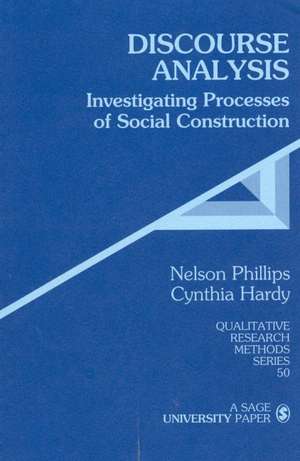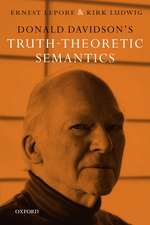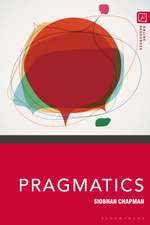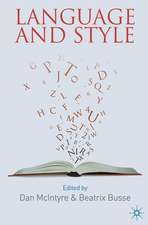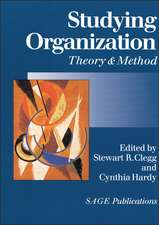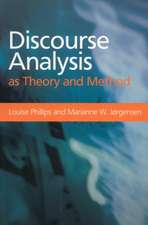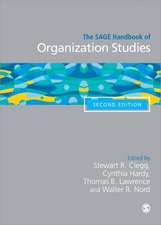Discourse Analysis: Investigating Processes of Social Construction : Qualitative Research Methods, cartea 50
Autor Nelson Phillips, Cynthia Hardyen Limba Engleză Paperback – 29 iul 2002
Discourse Analysis: Investigating Processes of Social Construction provides a concise, straightforward guide for students and researchers who are interested in understanding and using discourse analysis. Addressed to graduate students, academics and experienced researchers, this book is a comprehensive guide for those new to discourse analysis as well as for researchers in need of a complement to other modes of inquiry.
| Toate formatele și edițiile | Preț | Express |
|---|---|---|
| Paperback (1) | 317.10 lei 6-8 săpt. | |
| SAGE Publications – 29 iul 2002 | 317.10 lei 6-8 săpt. | |
| Hardback (1) | 606.15 lei 6-8 săpt. | |
| SAGE Publications – 29 iul 2002 | 606.15 lei 6-8 săpt. |
Din seria Qualitative Research Methods
-
 Preț: 271.07 lei
Preț: 271.07 lei -
 Preț: 305.18 lei
Preț: 305.18 lei -
 Preț: 304.73 lei
Preț: 304.73 lei -
 Preț: 273.68 lei
Preț: 273.68 lei -
 Preț: 304.17 lei
Preț: 304.17 lei -
 Preț: 271.07 lei
Preț: 271.07 lei -
 Preț: 306.42 lei
Preț: 306.42 lei -
 Preț: 305.60 lei
Preț: 305.60 lei -
 Preț: 306.14 lei
Preț: 306.14 lei -
 Preț: 304.77 lei
Preț: 304.77 lei -
 Preț: 306.69 lei
Preț: 306.69 lei -
 Preț: 304.51 lei
Preț: 304.51 lei -
 Preț: 305.03 lei
Preț: 305.03 lei -
 Preț: 134.60 lei
Preț: 134.60 lei -
 Preț: 288.79 lei
Preț: 288.79 lei -
 Preț: 290.33 lei
Preț: 290.33 lei -
 Preț: 287.82 lei
Preț: 287.82 lei -
 Preț: 290.54 lei
Preț: 290.54 lei -
 Preț: 289.56 lei
Preț: 289.56 lei -
 Preț: 288.04 lei
Preț: 288.04 lei - 18%
 Preț: 715.81 lei
Preț: 715.81 lei -
 Preț: 291.07 lei
Preț: 291.07 lei -
 Preț: 290.69 lei
Preț: 290.69 lei -
 Preț: 288.41 lei
Preț: 288.41 lei -
 Preț: 289.18 lei
Preț: 289.18 lei -
 Preț: 317.26 lei
Preț: 317.26 lei -
 Preț: 288.19 lei
Preț: 288.19 lei -
 Preț: 290.33 lei
Preț: 290.33 lei -
 Preț: 290.69 lei
Preț: 290.69 lei -
 Preț: 317.10 lei
Preț: 317.10 lei -
 Preț: 315.75 lei
Preț: 315.75 lei -
 Preț: 290.69 lei
Preț: 290.69 lei -
 Preț: 290.33 lei
Preț: 290.33 lei -
 Preț: 288.79 lei
Preț: 288.79 lei -
 Preț: 290.54 lei
Preț: 290.54 lei -
 Preț: 290.69 lei
Preț: 290.69 lei -
 Preț: 290.69 lei
Preț: 290.69 lei -
 Preț: 291.07 lei
Preț: 291.07 lei -
 Preț: 270.69 lei
Preț: 270.69 lei -
 Preț: 289.77 lei
Preț: 289.77 lei -
 Preț: 288.04 lei
Preț: 288.04 lei -
 Preț: 289.95 lei
Preț: 289.95 lei -
 Preț: 270.54 lei
Preț: 270.54 lei -
 Preț: 288.19 lei
Preț: 288.19 lei -
 Preț: 270.54 lei
Preț: 270.54 lei -
 Preț: 316.12 lei
Preț: 316.12 lei
Preț: 317.10 lei
Nou
Puncte Express: 476
Preț estimativ în valută:
60.68€ • 63.51$ • 50.50£
60.68€ • 63.51$ • 50.50£
Carte tipărită la comandă
Livrare economică 31 martie-14 aprilie
Preluare comenzi: 021 569.72.76
Specificații
ISBN-13: 9780761923626
ISBN-10: 0761923624
Pagini: 104
Ilustrații: Illustrations
Dimensiuni: 140 x 216 x 7 mm
Greutate: 0.15 kg
Ediția:New.
Editura: SAGE Publications
Colecția Sage Publications, Inc
Seria Qualitative Research Methods
Locul publicării:Thousand Oaks, United States
ISBN-10: 0761923624
Pagini: 104
Ilustrații: Illustrations
Dimensiuni: 140 x 216 x 7 mm
Greutate: 0.15 kg
Ediția:New.
Editura: SAGE Publications
Colecția Sage Publications, Inc
Seria Qualitative Research Methods
Locul publicării:Thousand Oaks, United States
Recenzii
“The authors have successfully achieved their intent: to produce a short, readable guide to discourse analysis. The book is suitable for doctoral students, academics and researchers wishing to understand the basics of discourse analysis. As a doctoral student, I found it a helpful overview of the current debates and practices surrounding this potentially daunting methodology.
The book is the 50th volume in the Sage Series on Qualitative Research Methods. It is a short guide on the theoretical background, empirical use and practical application of discourse theory. At only 97 pages including bibliography, it is an accessible, yet content-rich overview of discourse theory. As I am new to discourse analysis, I found chapters one (a definition and rationale for discourse analysis), two ( the theory and practical examples of discourse analysis) and four (how to conduct research using discourse analysis) the most useful. These chapters provide clear and practical information on why and how to use discourse theory in research. Chapters three is a reflection by the authors on their use of discourse theory in various project. It is useful in understanding the range of research questions and organizations that can be studied using this technique. Chapter 5, the conclusion, has a useful table describing how reflexivity should be applied in discourse analysis and points the way for new directions in using discourse analysis.
The strengths of the book include an extensive bibliography, helpful for those readers in search of disciplines and projects which use discourse analysis: for example, psychology, political science, business and management and environment studies.
The weakness is that the authors argue that discourse analysis contributes to the plurality of research methods; however, it is hard to see how the requirement for a social constructivist philosophy would fit alongside a positivist philosophy, in a quantitative analysis, for example, in a mixed methods study.
In summary, this book is an essential starting point for anyone considering using this technique, which is well established in the UK, although less so in the USA. The authors must be applauded on this interesting and elegant introduction to a powerful technique.”
The book is the 50th volume in the Sage Series on Qualitative Research Methods. It is a short guide on the theoretical background, empirical use and practical application of discourse theory. At only 97 pages including bibliography, it is an accessible, yet content-rich overview of discourse theory. As I am new to discourse analysis, I found chapters one (a definition and rationale for discourse analysis), two ( the theory and practical examples of discourse analysis) and four (how to conduct research using discourse analysis) the most useful. These chapters provide clear and practical information on why and how to use discourse theory in research. Chapters three is a reflection by the authors on their use of discourse theory in various project. It is useful in understanding the range of research questions and organizations that can be studied using this technique. Chapter 5, the conclusion, has a useful table describing how reflexivity should be applied in discourse analysis and points the way for new directions in using discourse analysis.
The strengths of the book include an extensive bibliography, helpful for those readers in search of disciplines and projects which use discourse analysis: for example, psychology, political science, business and management and environment studies.
The weakness is that the authors argue that discourse analysis contributes to the plurality of research methods; however, it is hard to see how the requirement for a social constructivist philosophy would fit alongside a positivist philosophy, in a quantitative analysis, for example, in a mixed methods study.
In summary, this book is an essential starting point for anyone considering using this technique, which is well established in the UK, although less so in the USA. The authors must be applauded on this interesting and elegant introduction to a powerful technique.”
Cuprins
Preface
1. What is Discourse Analysis?
Defining Discourse Analysis
Reasons for Using Discourse Analysis
What Lies Ahead
2. The Variety of Discourse Analysis
Theoretical Perspectives in Dscourse Analysis
Empirical Studies in Discourse Analysis
A Useful Methodology
3. Our Research Program
Studying Identity
Revitalizing Our Critical Approach
A New Perspective on Exsisting Theoretical Debates
Why We Use Discourse Analysis
4. The Challenges of Discourse Analysis
Developing a Research Question
Selecting a Site
Collecting Data
Analyzing the Data
Writing Up the Study
Make It Interesting
5. Conclusions
Contributions
Challenges
On a Personal Note
References
About the Authors
1. What is Discourse Analysis?
Defining Discourse Analysis
Reasons for Using Discourse Analysis
What Lies Ahead
2. The Variety of Discourse Analysis
Theoretical Perspectives in Dscourse Analysis
Empirical Studies in Discourse Analysis
A Useful Methodology
3. Our Research Program
Studying Identity
Revitalizing Our Critical Approach
A New Perspective on Exsisting Theoretical Debates
Why We Use Discourse Analysis
4. The Challenges of Discourse Analysis
Developing a Research Question
Selecting a Site
Collecting Data
Analyzing the Data
Writing Up the Study
Make It Interesting
5. Conclusions
Contributions
Challenges
On a Personal Note
References
About the Authors
Descriere
Discourse Analysis: Investigating Processes of Social Construction provides a concise, straightforward guide for students and researchers who are interested in understanding and using discourse analysis.
